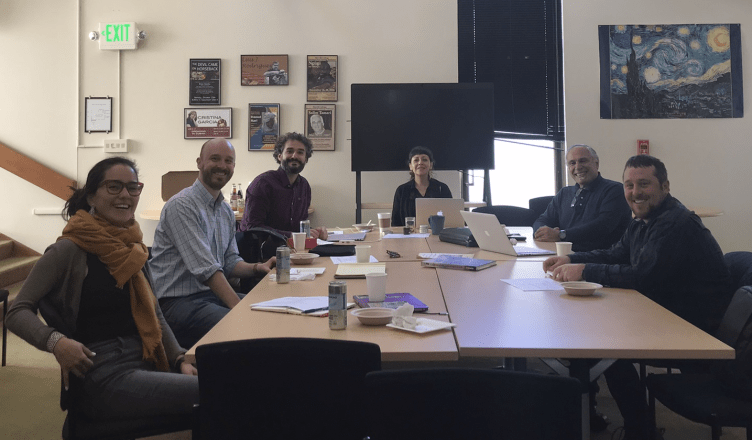By: Fernando Leiva
It is with great pleasure that I perform this long overdue task: officially launching the blog series of our Extractivism & Society Research Cluster.
Despite many accomplishments under its belt (webinars, journal articles, film screenings, research reports, conference panels, etc), our cluster formed in 2019, had lagged in using the blog format.
Yet, it is an ideal medium for informing communities about our work, about our cluster’s mission: bringing together scholars, students, and community activists to produce “knowledge for action.”
And at this historical juncture of profound geopolitical realignments, prolonged crises of global neoliberalism, and deepening socio-ecological catastrophes, producing knowledge to better understand and more effectively transform the world, is more necessary than ever. It is literally, a matter of collective survival.
Here are two reasons why this more fluid way of sharing knowledge for action using the Blog Series is important.
First, the concept of “extractivism,” that Latin American thinkers like Eduardo Gudynas, Alberto Acosta, and Maristella Svampa, decisively helped define, has swiftly evolved and will continue evolving at a rapid pace. As research on extractivism expands, some have called for the adoption of the concept of “global extractivism” as a conceptual tool to account for the many different fields of research involved in analyzing resource extraction practices around the globe.
Hence, there is a lively debate about how to define extractivism more broadly than a decade ago. One suggestion, for example, is to define it as “a complex of self-reinforcing practices, mentalities, and power differentials underwriting and rationalizing socio-ecologically destructive modes of organizing life through subjugation, depletion and non-reciprocity” (Chagnon et al. 2022: 763).[1] Whatever the limitation of such definition (and there are a few), the fact is that we need to rethink extractivism so that it is not conceived as a phenomenon afflicting just individual nations in the so called Global South, but that we envision it truly as global complex, one that, through multiple webs of production, transport, finance, colonialism, and consumption, deeply connects, for example, the extraction of lithium from high-Andean salt flats to the eco lifestyles of Tesla-drivers and communities of color in California.
Second, under the banner of “inclusive and sustainable mining,” mythmaking and socio-territorial embedding have increasingly come to constitute the soul of today’s global extractivism. Concocting compelling narratives that appeal to emotion and “common sense,” combined with novel techniques for deeply embedding themselves within the socio-cultural fabric and psychic life of communities comprise the distinctive modus operandi of modern transnational extractive conglomerates. We observe how oil, copper, lithium transnational conglomerates claim the mantle of being the indispensable catalysts for green transition and a post-carbon future. However the attention of scholars and many activists remains still focused elsewhere: on how extractive industries organize planetary level circuits of extraction that intricately intermingle primary commodity production, finance, logistics, and urbanization; and/or provocative debates on how to best conceptualize the relation between capitalism and nature in times of global climate disaster.
Yet, the semiotic or meaning-making practices of contemporary global extractivism remain chiefly unexplored. Distinctly new practices by copper, lithium, iron, oil, and gold extraction transnational conglomerates are redrawing the material, semiotic, and socio-ecological foundations of extractivism at a very fast pace.
The E&S Blog Series we launch today, aims therefore to be a means for keeping abreast of these unfolding developments. It also aims to be an expression of our commitment as scholars to critically investigate these trends and to become an invitation to communities of practice beyond the proverbial “ivory tower” to share their insights on these matters.
We envision the blog series as a commitment in the sense that cluster members will employ it to regularly and less formally share our progress, individual and collective, in the co-production of knowledge for action. The blog series aspires to reflect our learning in forging sharper analytical tools as well as map how our “horizons of desire” open up new paths.
At the same time, the E&S Blog Series wants to be an invitation to the many researchers, students, and community leaders that have participated in our activitities, to be part of an on-going conversations about our shared efforts beyond to better understand the impacts of extractivism and imagine just alternatives. When we speak, when we listen, as the poet Raul Zurita states, a rebirth takes place. His words encapsulate the spirit behind the launch of the Blog Series:
“What is so touching about the world; is that each speck of dust, each leave of grass, each steppe, is the port of arrival for a river of the deceased; where those who preceded us, meet again, and to whom, when we speak, when we see, when we listen, in sum, when we exercise life, we bestow the opportunity of a new existence.”
Eso es lo conmovedor del mundo, cada grano de polvo, cada hierba, cada estepa, es el puerto de llegada de un río de difuntos, en el cual los que nos han precedido se encuentran y a quienes nosotros al hablar, al ver, al oír, en suma, al ejercer la vida les estamos dando la oportunidad de una existencia nueva.”
Raul Zurita (2000), p. 170
Sobre el amor, el sufrimiento y el nuevo milenio
[1] Chagnon, C. et al. (2022) “From extractivism to global extractivism: the evolution of an organizing concept,” The Journal of Peasant Studies, 49:4, 760-792, DOI: 10.1080/03066150.2022.2069015

